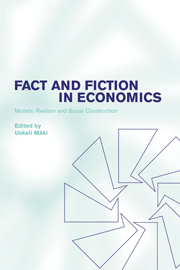Book contents
- Frontmatter
- Contents
- Notes on the contributors
- Preface
- I Introduction
- II Setting the scene
- 2 Ugly currents in modern economics
- 3 Modern economics and its critics
- 4 Some nonreasons for nonrealism about economics
- III Economic models and economic reality
- IV The constitution of economic reality
- V The institutions of economics
- Index
- References
3 - Modern economics and its critics
Published online by Cambridge University Press: 22 September 2009
- Frontmatter
- Contents
- Notes on the contributors
- Preface
- I Introduction
- II Setting the scene
- 2 Ugly currents in modern economics
- 3 Modern economics and its critics
- 4 Some nonreasons for nonrealism about economics
- III Economic models and economic reality
- IV The constitution of economic reality
- V The institutions of economics
- Index
- References
Summary
Prologue
Most economists I know have little time for the philosophy of economics as an intellectual discipline. They have even less patience with economic methodology. They prefer instead to do economics. If they are involved in serious methodological discussion at all, it is during the process of conducting economics research or preparing their findings for publication. They do so in the latter stage, for example, and they do so often unashamedly, when commenting on the weaknesses of previous work before saying why they feel their own work is superior.
There is much to be said for this habit. Far and away the most effective criticisms of current-practice economics that I have read have come from those who themselves have been engaged in research in economics, rather than in its philosophy or, more narrowly, in its methodology. Indeed, I know of no contemporary practicing economist whose investigations have been aided by the writings of professional methodologists.
Why has this been so? One reason may be that people who do economics usually know more about the strengths and weaknesses of current-practice economics than those who have neither acquired nor sifted data, nor experimented with alternative theoretical constructions so as to judge which construction is likely to improve upon that which has been explored and which is unlikely to do so. It would have been of no moment, for example, to tell those econometricians in the 1950s who developed the linear-expenditure system for studying consumer behavior in the UK that it is a restrictive system: they already knew it, but nevertheless had good reasons for adopting it.
- Type
- Chapter
- Information
- Fact and Fiction in EconomicsModels, Realism and Social Construction, pp. 57 - 89Publisher: Cambridge University PressPrint publication year: 2002
References
- 21
- Cited by



